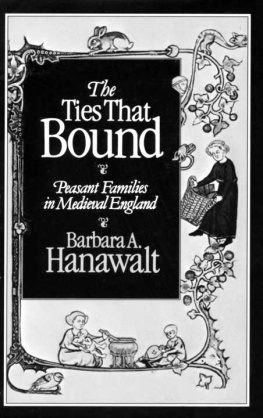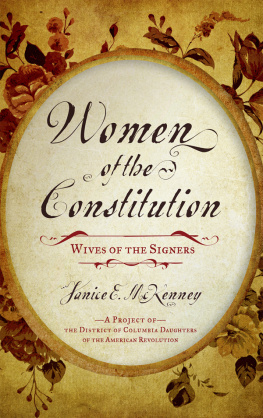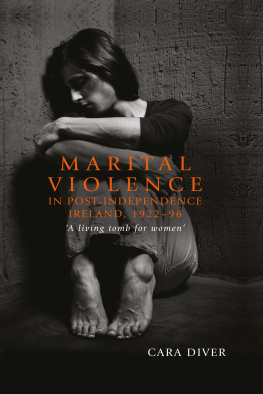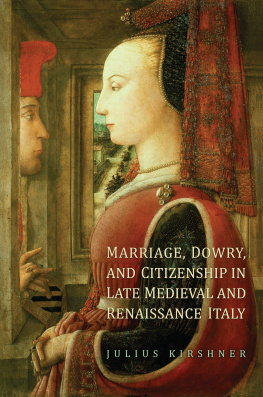The Wealth of Wives
The Wealth of Wives
Women, Law, and Economy in Late Medieval London
BARBARA A. HANAWALT

2007

Oxford University Press, Inc., publishes works that further Oxford Universitys objective of excellence in research, scholarship, and education.
OxfordNew York
AucklandCape TownDar es SalaamHong KongKarachi
Kuala LumpurMadridMelbourneMexico CityNairobi
New DelhiShanghaiTaipeiToronto
With offices in
ArgentinaAustriaBrazilChileCzech RepublicFranceGreece
GuatemalaHungaryItalyJapanPolandPortugalSingapore
South KoreaSwitzerlandThailandTurkeyUkraineVietnam
Copyright 2007 by Oxford University Press, Inc.
Published by Oxford University Press, Inc.
198 Madison Avenue, New York, New York 10016
www.oup.com
Oxford is a registered trademark of Oxford University Press
All rights reserved. No part of this publication may be reproduced, stored in a retrieval system, or transmitted, in any form or by any means, electronic, mechanical, photocopying, recording, or otherwise, without the prior permission of Oxford University Press.
Library of Congress Cataloging-in-Publication Data
Hanawalt, Barbara.
The wealth of wives : women, law, and economy in late medieval
London / Barbara A. Hanawalt.
p.cm.
Includes bibliographical references and index.
ISBN 978-0-19-531175-4; 978-0-19-531176-1 (pbk.)
1. WomenEnglandLondonHistoryTo 1500.2. WomenEnglandLondonEconomic conditions.3. WomenEnglandLondonLegal status, laws, etc.4. EnglandSocial conditions10661485.I. Title.
HQ1147.G7H36 2007
306.872'309421'209023dc22 2007011346
Preface
A preface is a time to reflect about the process of concluding a major project. This book was a particularly challenging one to write because the materials on London women are scattered through a number of archival sources, both printed and in manuscript. It is a study that involves the history of women, feminist theory, legal and economic history, and Londons history. The project began as part of a larger study of London social and family history. In 198889 I had an ambitious project to do for London what I had done for the peasants in The Ties That Bound: Peasant Families in Late Medieval England. I had planned to do the life cycles of medieval Londoners from the cradle to the grave. Thanks to a fellowship from the Guggenheim Foundation, I spent that year in the London archives copying life-cycle events for men, women and children. In 199091 I was honored with a fellowship to the Wissenschaftskollege zu Berlin. A third of the way through the year I was still struggling with childhood when a friend suggested that I simply write a book on childhood in London. Brilliant, I thought, and finished that book within a year. Women would form a second book, and men will be considered in a separate study on dispute resolution. Writing on children and childhood was a delight, because the evidence was wonderful and a target as big as Philippe Aris was easy to attack. But writing on women in London turned out to be far more complicated. I started the most complex part of the project at the National Humanities Center in 199798 on a grant from the National Endowment for the Humanities. This segment of the project was to discover the legal rights of women in inheritance, dowry, and dower in medieval London.
No comprehensive book or set of articles exists on the legal rights of women in London, which necessitated reconstructing this complicated system from laws and ordinances written at the time and from the actual court cases in which the laws were reiterated as they were applied or interpreted. It has been a challenge, and I hope that I have laid the groundwork that can be corrected with further research. Doing such original research is both challenging and daunting. As a graduate student, I admired the men who originally worked out the grand narrative of political history, but I have come to realize that I and others have worked on more difficult narratives, that of the people whose voices were absent, muted, or distorted in the chronicles and official records. For historians such as myself, it is the discovery of these voices and the creation of a narrative of their lives and the changes that they experienced that are so exciting. It is difficult work and involves long hours in archival materials that will never be easily microfilmed or put on a website. One must shuffle through the parchment and rejoice in the evidence found there. Sometimes it is an individual case, but if the social science researcher is lucky, it will be a long series of documents that can be quantified. Single cases are a problem, because they do not represent a general picture. They are engaging, but one wonders if they are a typical or an aberrant case. The quantifiable evidence is a statistical comfort, but one does not often get it in medieval records in England.
It is one thing to write about the social and legal history of London women, but another to engage in the feminist historiography that has evolved in the late 1990s and the early twenty-first century. Medieval London women were not feminists in these terms. I have, since the beginning of my serious career as a historian, been aware of the problems facing women as historians. I had excellent female professors at Douglass College who warned me that I would face discrimination as a woman historian. At Michigan I even had a male historian who warned me that I would have to publish twice as much as men to make it in the profession.
I have been a feminist for most of my life. My mother was a school teacher who made her own way until the depression ended and she married my father. She stood by me in my complaints about unequal salary, which she had also experienced. My father, a professor of psychology, had a great admiration for my academic career as a historian. I have served on many committees in universities that oversaw the promotion of women and tried to overcome prejudices against them. I sometimes won and sometimes lost, but it was a good cause. However, I have not tried to introduce into my own writing a present-day assumption that women in the Middle Ages could move significantly outside the boundaries of patriarchy. Women in my own family imbibed the assumptions of patriarchy and lived within the boundaries. But they had their own strengths and voices as well; they were not Victorian shrinking violets. One woman brought her four sons from England as a widow and settled in America. But the first conscious feminist voice I heard of in my family was a great-grandmother, a suffragette, who cut her hair and wore it in a snood. My mother, as a school teacher, bought a car in the early twentieth century to drive to her one-room school. When she married, she seldom drove, and reverted to the assumptions of a housewife and mother. Women accommodate to the situations they find, and I feel very lucky to have had a career in a period of womens liberation.
Although an active feminist, I do not try to find early feminists in London and do not set out to prove that late twentieth-century emancipation can be found in the Middle Ages. Single examples of exceptional women cannot be read as typical of society as a whole. Patriarchy was a strong force, and still is. Women knew, and know, the importance of it as well as men.









